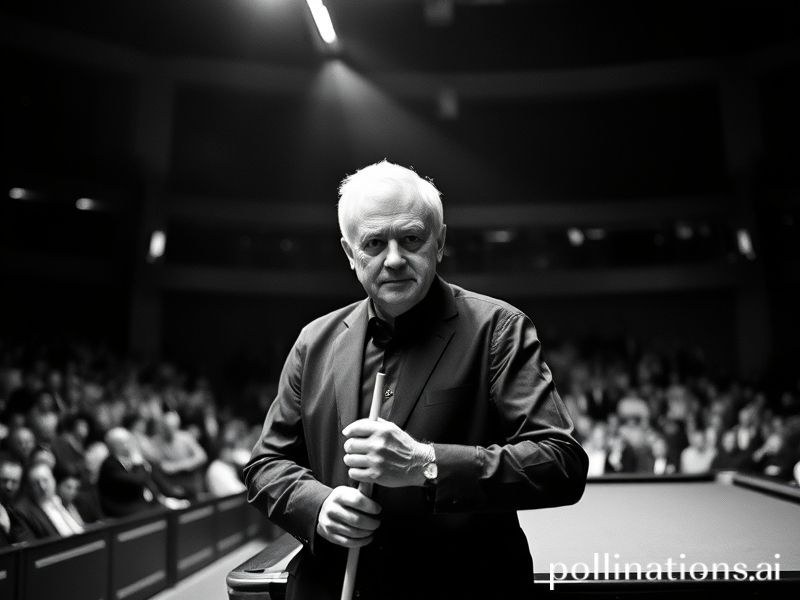Barry Hearn: The Dagenham Deal-Maker Who Sold Darts to the World (and Made Deserts Pay-Per-View)
Barry Hearn: How a Cockney Accountant Turned Darts Players into Gladiators and the World into a Pay-Per-View Colosseum
By “Lucky” Laurent Dupré, usually stationed in places where the sport involves live ammunition
LONDON—Somewhere between the fall of the Berlin Wall and the rise of TikTok, Barry Hearn, a bespectacled former accountant from Dagenham, quietly rewired the planet’s pleasure circuits. While the rest of us were busy doom-scrolling through recessions, pandemics, and climate reports that read like suicide notes, Hearn convinced entire hemispheres that watching two men throw miniature arrows at a wall could be as globally consequential as a G-20 summit—only with better walk-on music.
The trick, of course, was packaging. Hearn didn’t invent snooker, darts, boxing, fishing, or that curious British pastime where grown men jog behind a small metal ball (they call it “walking,” bless them). What he did was inject each pastime with the production values of a Marvel trailer and the transactional ethics of a Las Vegas wedding chapel. The result? A sprawling empire—Matchroom Sport—that beams gladiatorial bingo into 180 countries and makes the IOC look like a village raffle committee.
Global Context, or How to Monetize Existential Dread
In the early 1980s, snooker was a smoky after-dinner diversion for men whose ties were wider than their ethics. Hearn stepped in, signed a slate-wielding Steve Davis, and—presto—turned clacking colored balls into a Cold War proxy battle. When the Berlin Wall finally crumbled, the sport’s television rights were already humming along satellite feeds, teaching newly liberated East Europeans that Western freedom smelled faintly of chalk dust and sponsorship patches.
By the 2000s, globalization had become less about ideology and more about bandwidth. Hearn, ever the visionary, realized that if a Filipino could game-call-center his way through the night shift, he could also watch Manny Pacquiao knock someone into next week at 4 a.m. Manila time, provided the price point was south of dignity. Pay-per-view became the opium of the overworked masses, and Hearn the courteous dealer, always ready with a new strain: Premier League Darts, World Pool Masters, even competitive fishing—because nothing soothes late-stage capitalism like watching a man wrestle a carp for prize money that wouldn’t cover his divorce settlement.
The Algorithmic Afterlife
Now 75, Hearn has stepped down as chairman of Matchroom, handing the joystick to his son Eddie, who possesses the haircut of a Bond villain and the transactional warmth of an airport scanner. Together they’ve pivoted to streaming, because nothing says “eternal youth” like selling niche sports to Gen Z audiences who can’t remember a world without Fortnite. The new battlefield is China, where 300 million people allegedly watched a snooker final last year—roughly the population of the United States deciding that green baize is preferable to student-loan anxiety.
Meanwhile, the Middle East has discovered that staging a boxing bout in a purpose-built arena is cheaper than hosting a World Cup and comes with fewer migrant-worker headlines. Riyadh Season, meet Eddie Hearn; Eddie, meet a sovereign wealth fund that thinks human rights are a nice-to-have. The fight posters practically design themselves: “Clash on the Dunes—Because Even Deserts Need Content.”
Broader Significance, or Why Your Grandma Now Knows What a 9-Darter Is
Strip away the pyrotechnics and you’ll find a universal truth: people will pay to watch other people excel at something—anything—if the stakes feel epic. Hearn intuited that the stakes don’t actually have to be epic; they just need to be lit like a Michael Bay fever dream. In doing so, he’s exported a particularly British talent for turning mild eccentricity into global spectacle, the same way the empire once turned tea into a reason for maritime invasion.
And so, from Lagos barrooms where fans stream darts on cracked Androids to Tokyo pachinko parlors flickering with boxing undercards, the Hearn method prevails: shrink-wrap culture, slap on a hashtag, and sell it back to us at a 40% markup. In a world tilting toward entropy, that’s a curiously reassuring racket—proof that while civilizations may crumble, someone will still be hawking premium tier access to the ruins.
Barry Hearn never promised us meaning; he sold us distraction expertly disguised as destiny. In 2024, that passes for statesmanship.







